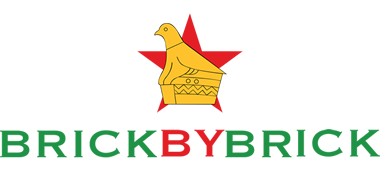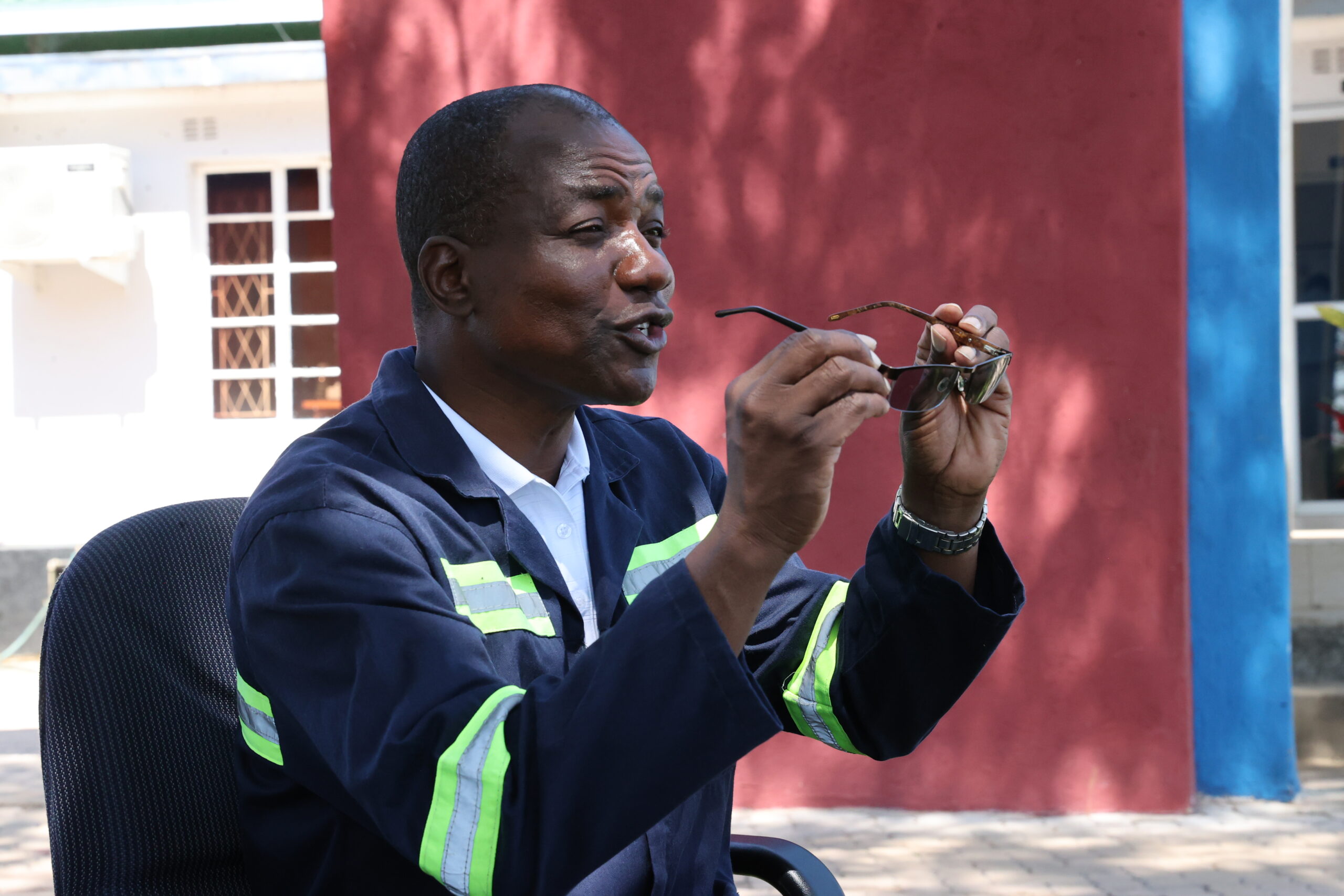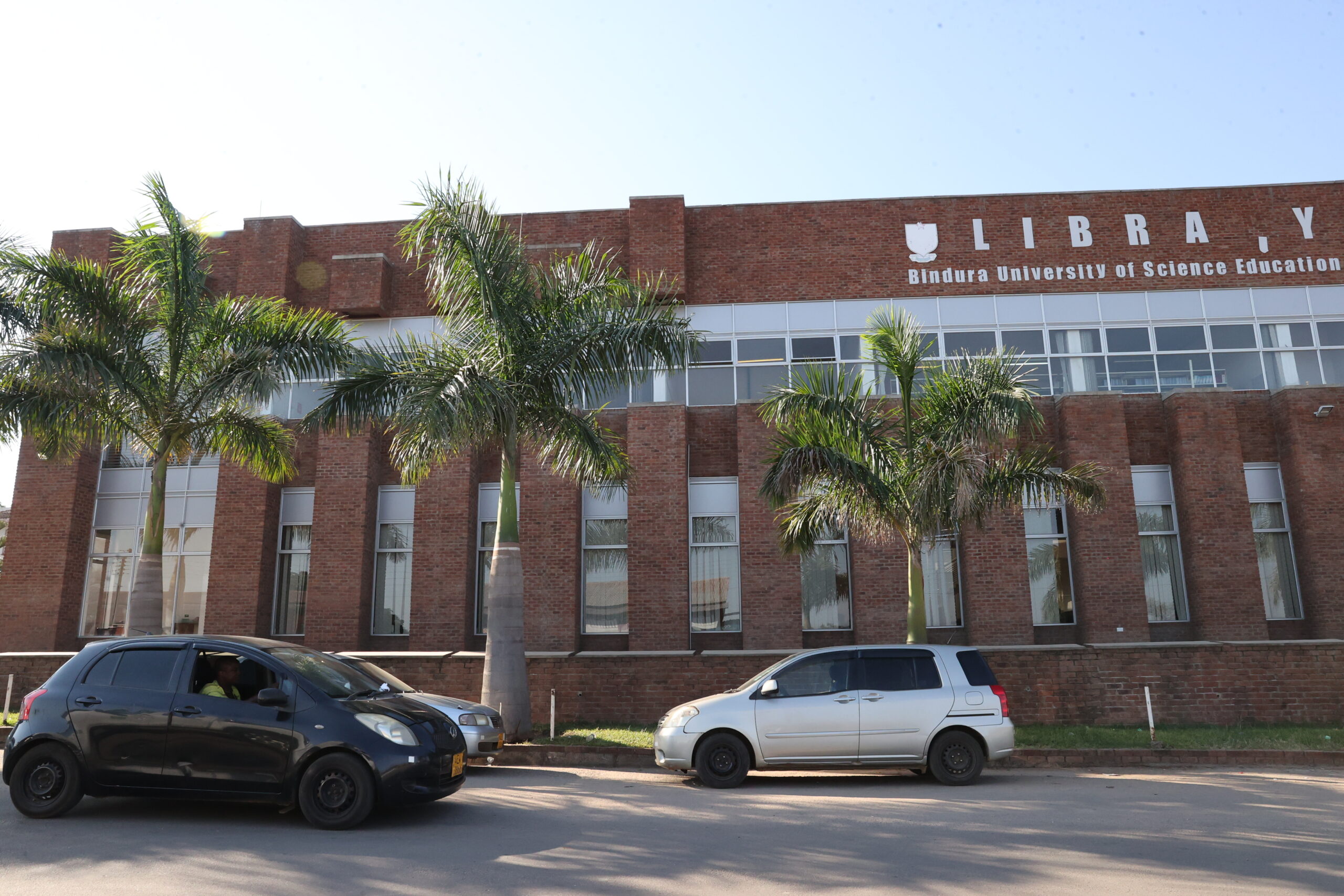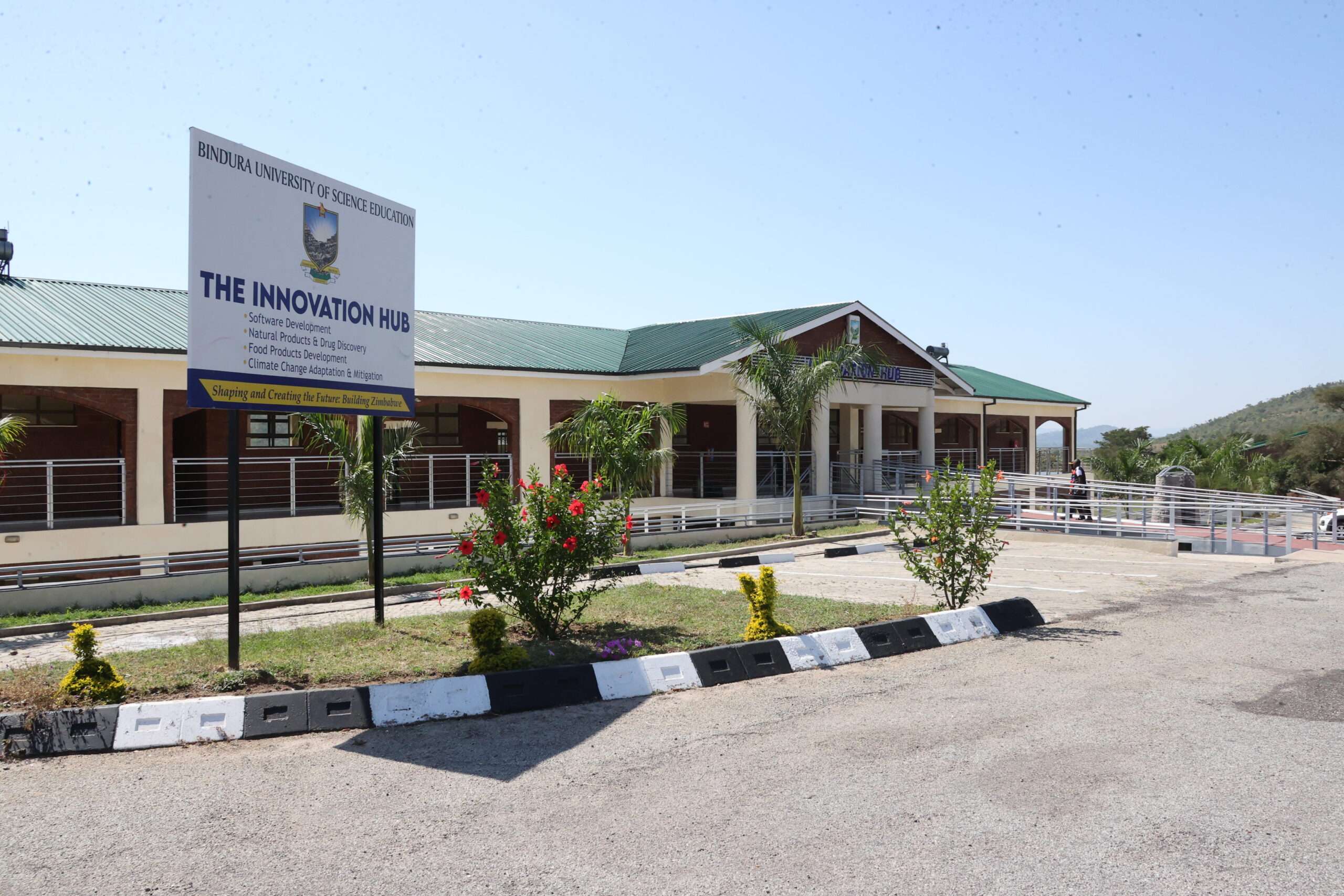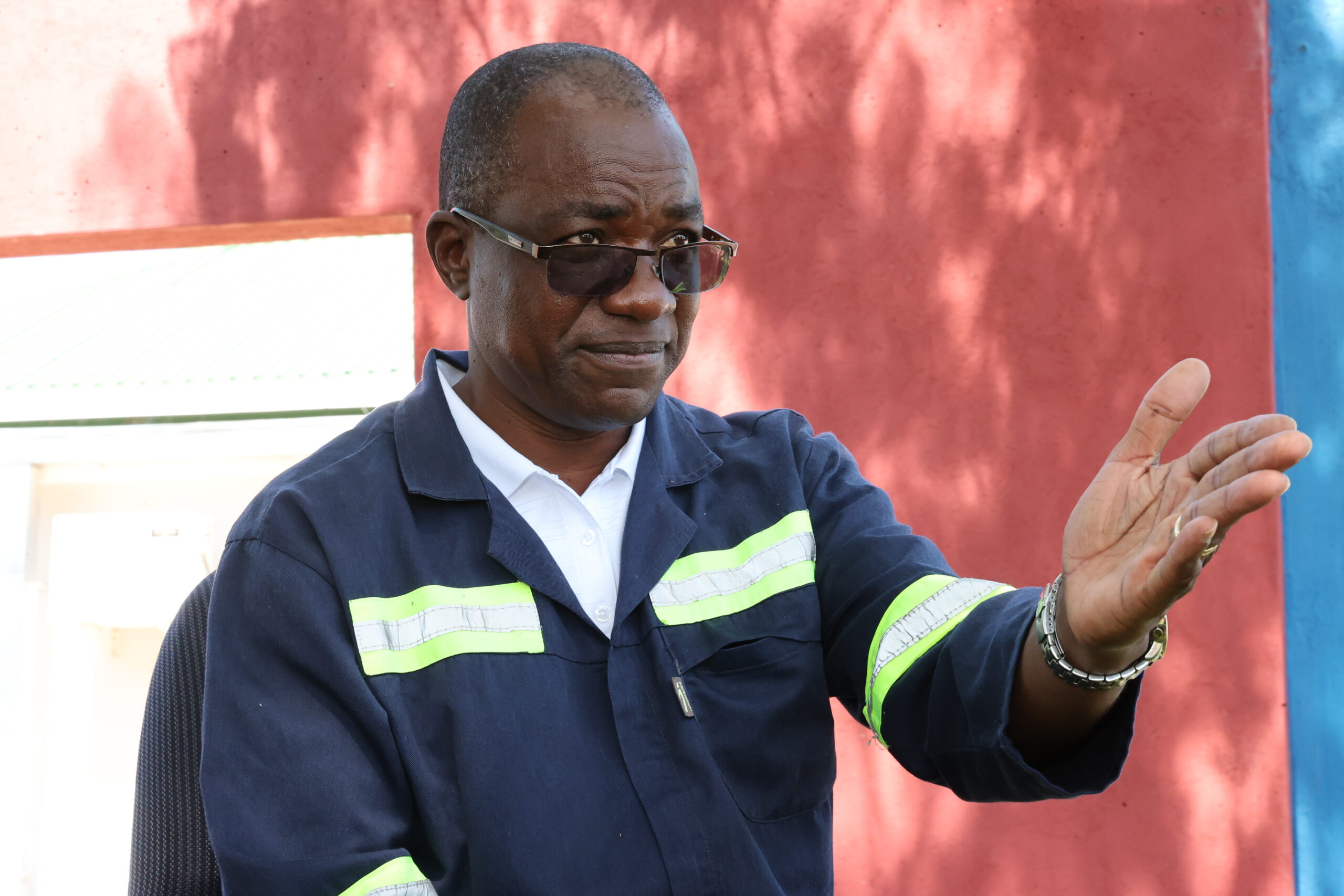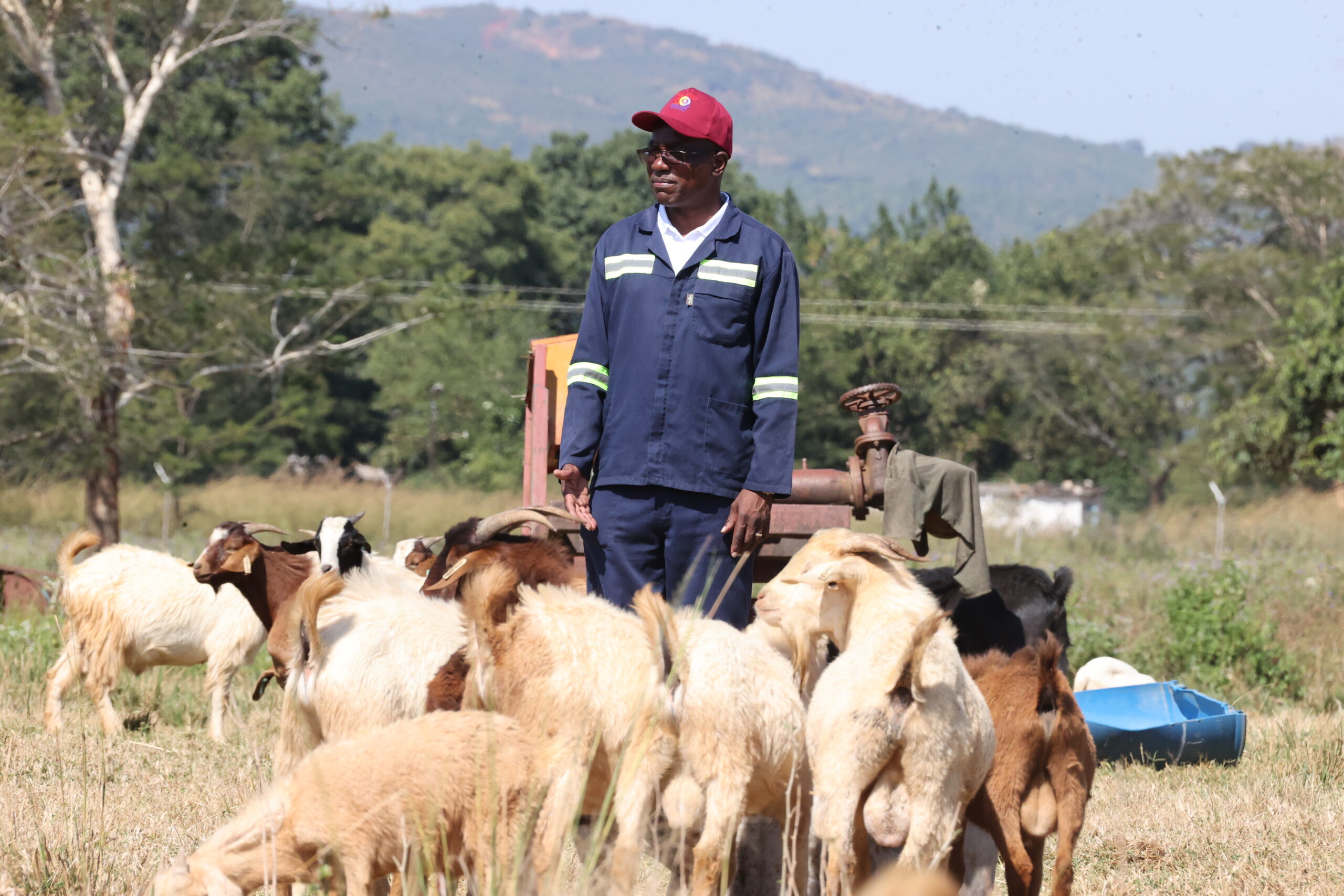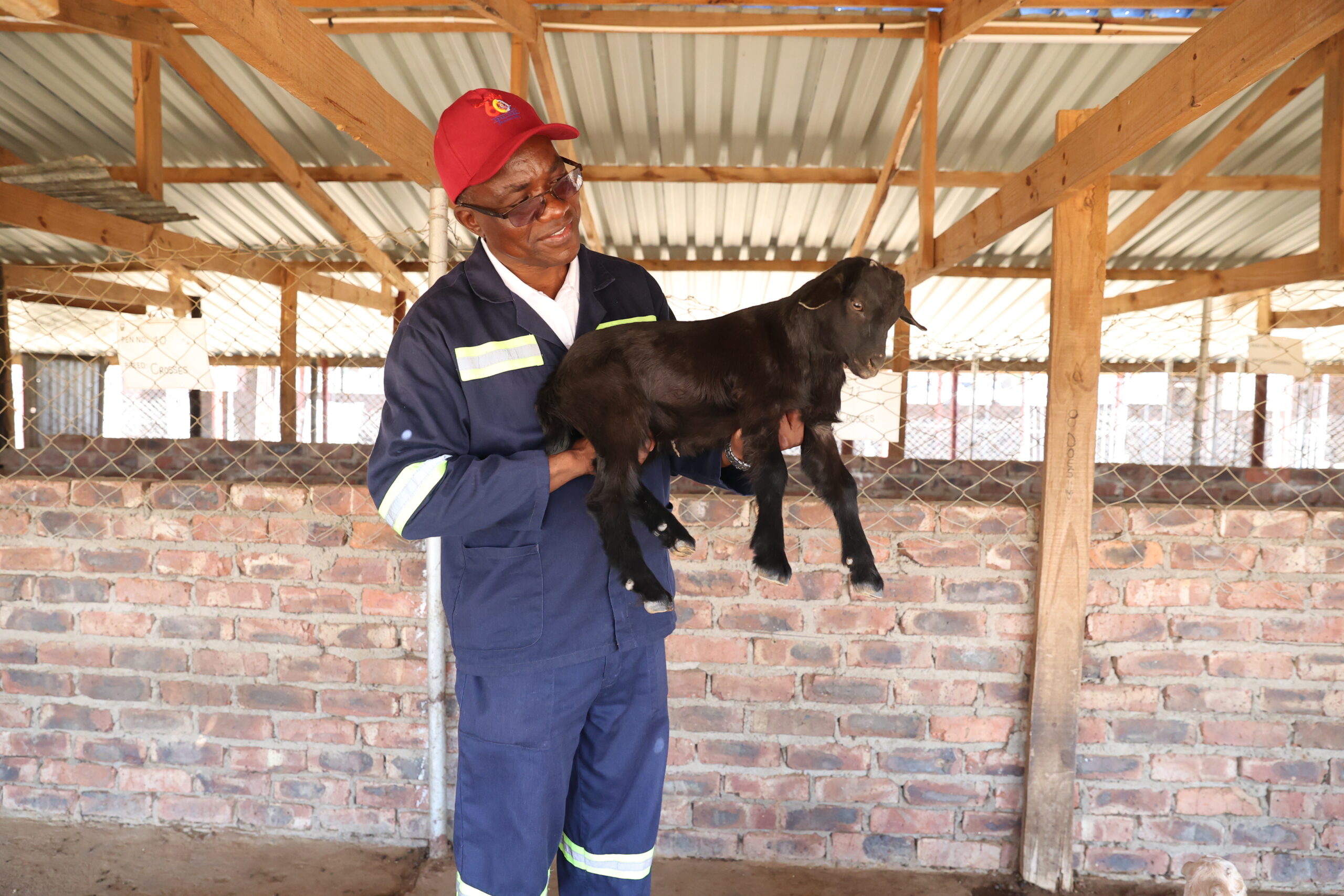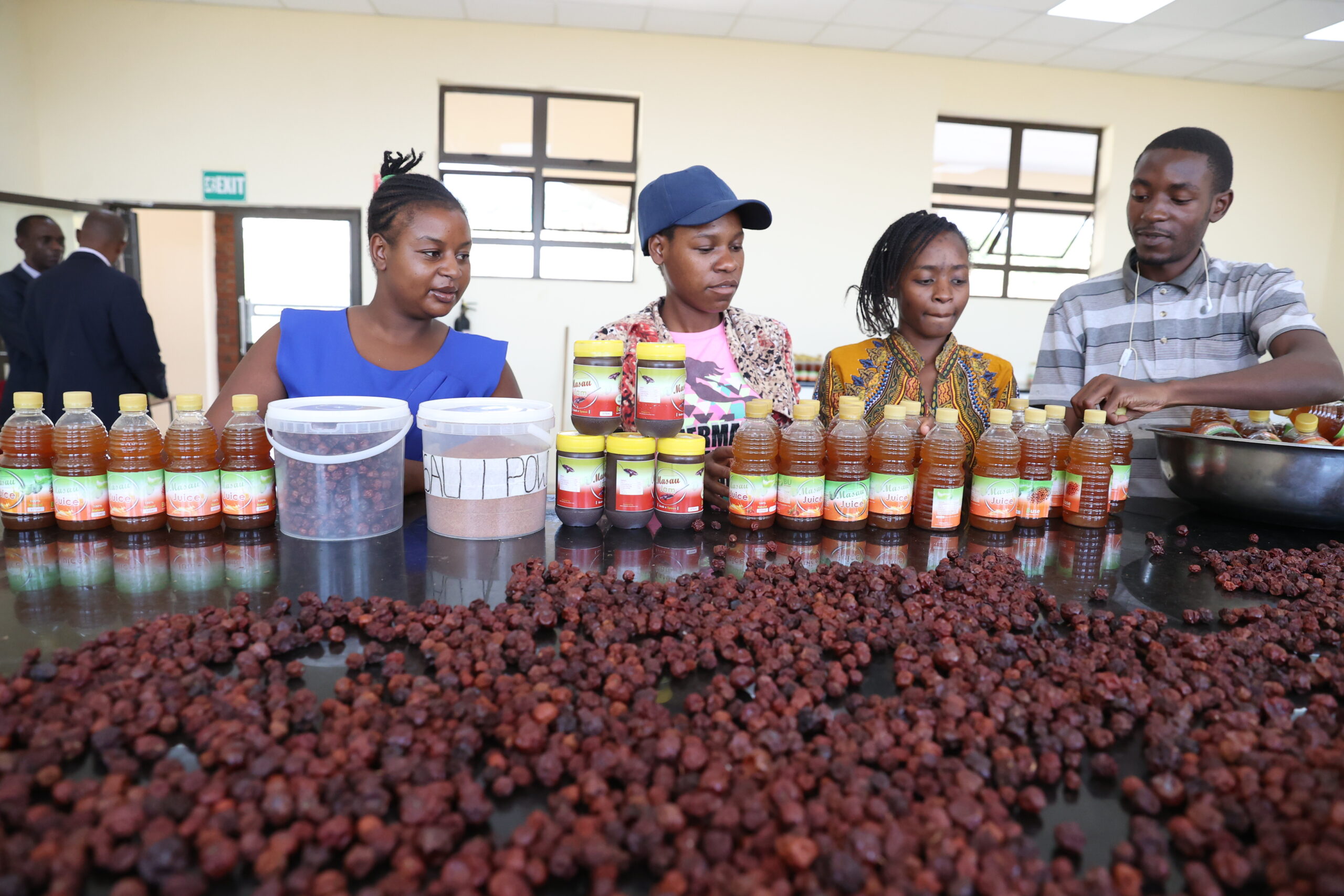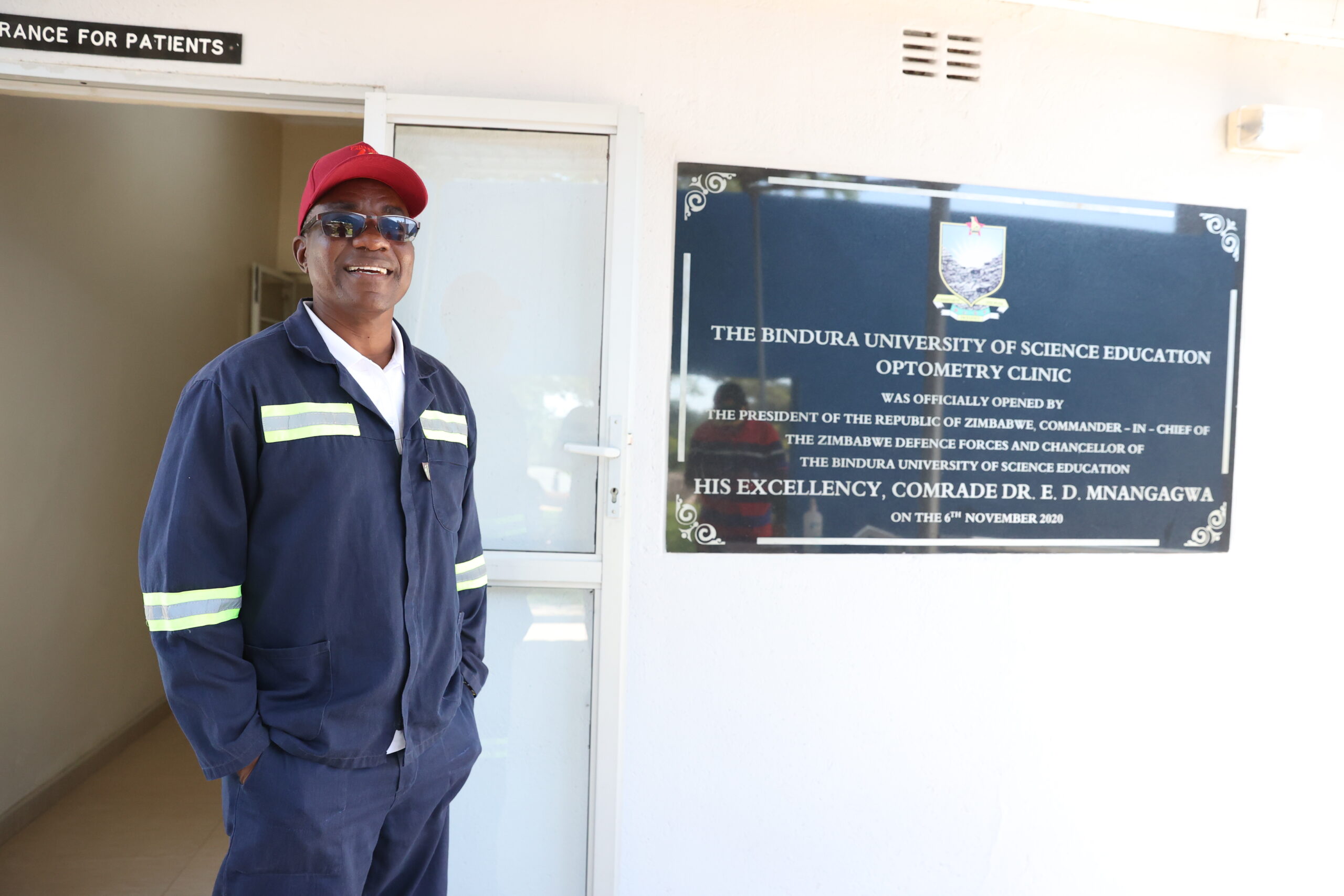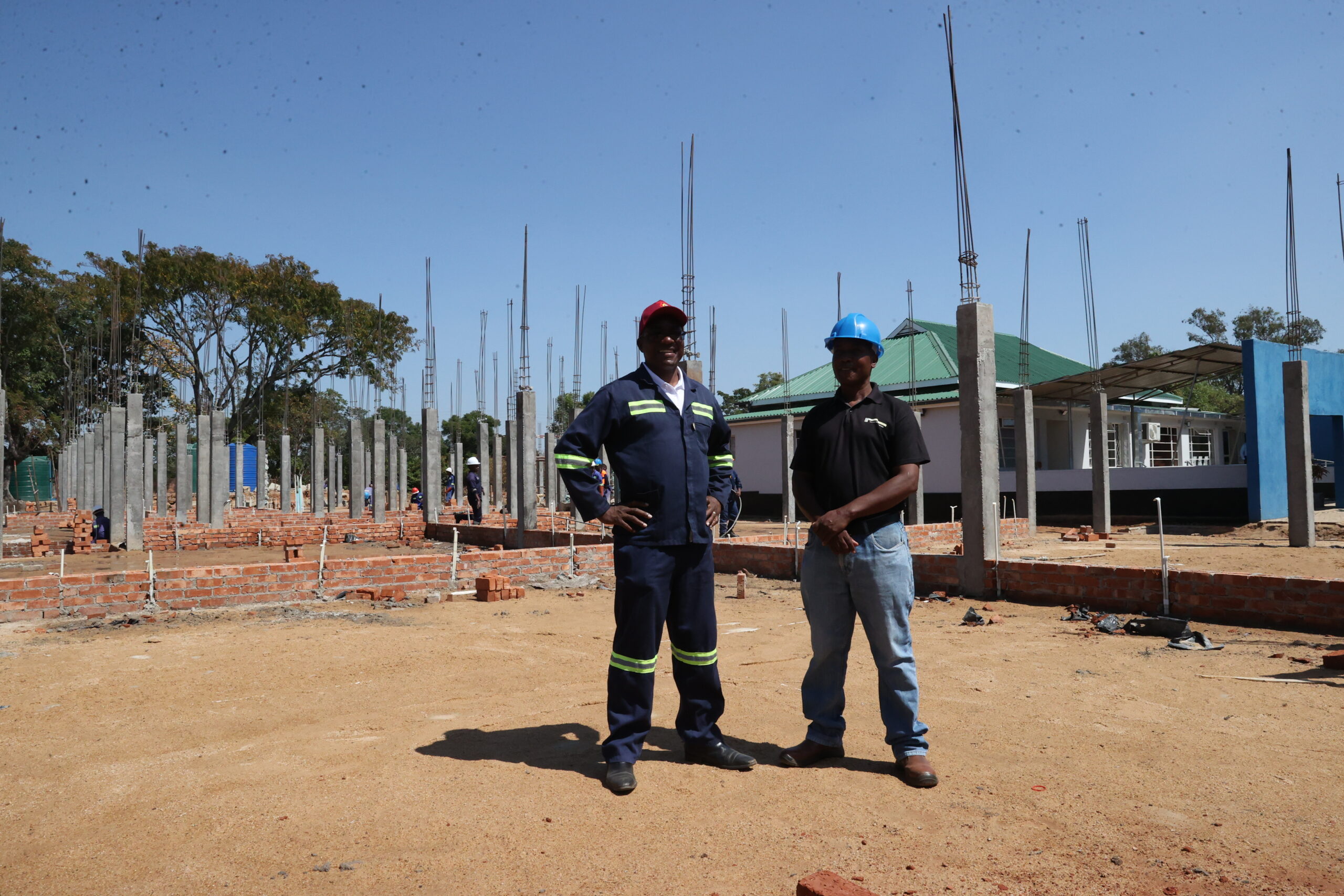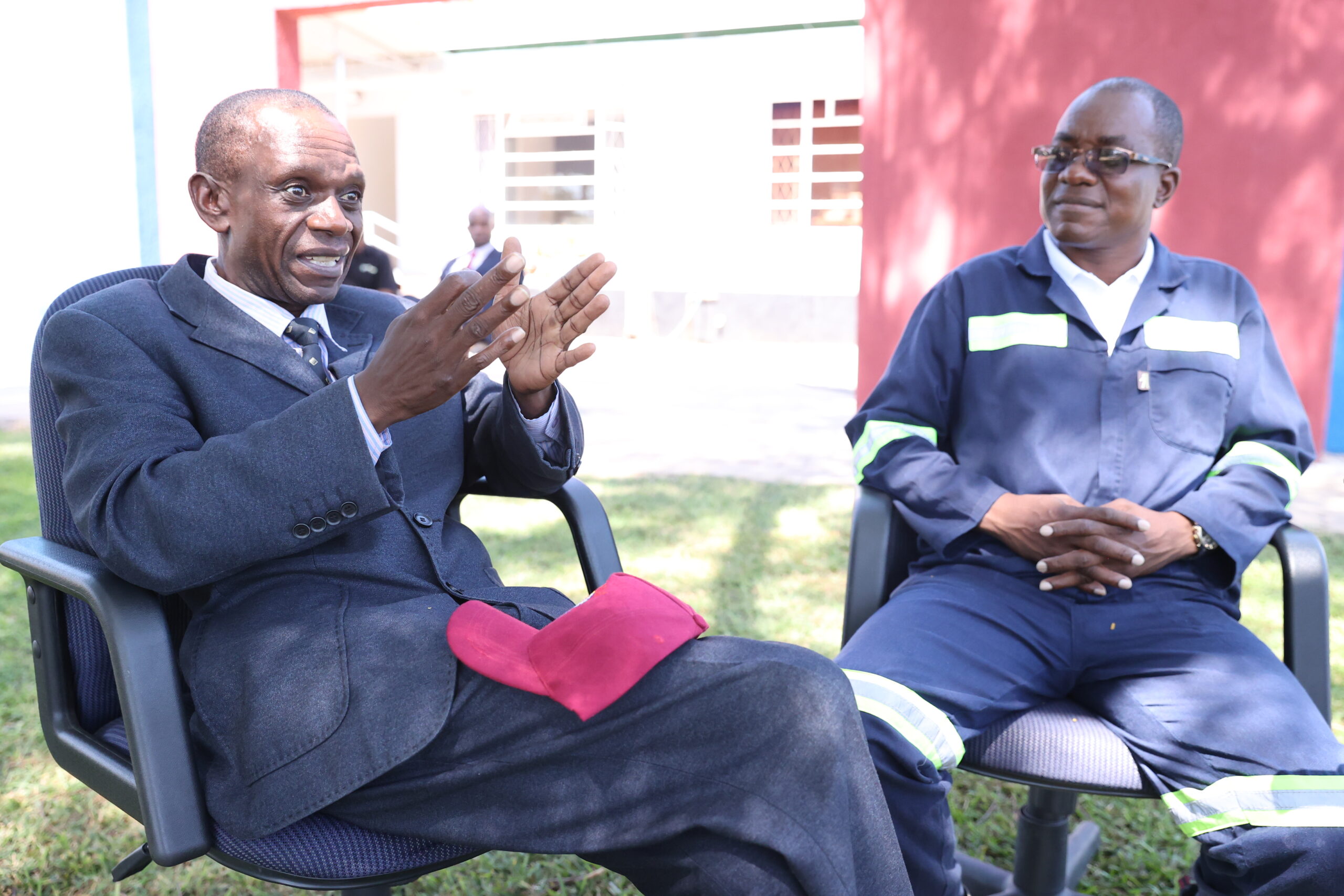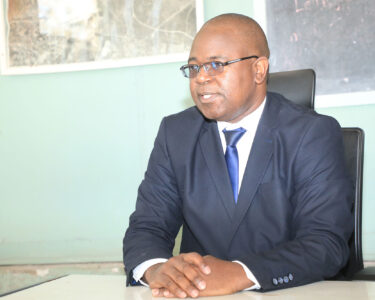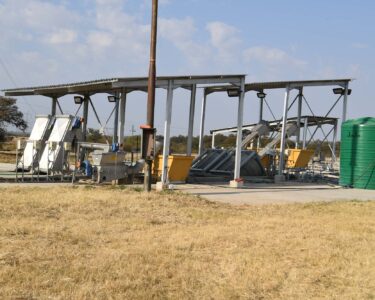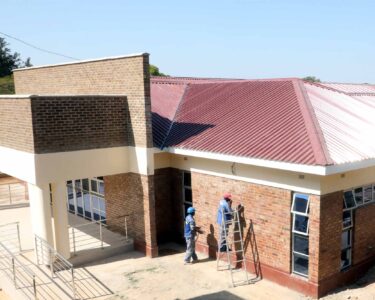… ‘They indicated that they will support, and they have supported’
… ‘Education 5.0 has been a game changer’
Prof Eddie Mwenje is the Vice Chancellor of the Bindura University of Science Education (BUSE). A professor of microbiology and biotechnology, he trained at the University of Zimbabwe and Birmingham University in the UK, and now he is over the moon with the Second Republic’s Education 5.0 policy. He can’t stop talking about the merits of Education 5.0, and how the Second Republic has been faithful to BUSE. “…One of the things that we are so grateful for is that the Second Republic is true to its words,” he told Brick by Brick. “They have indicated that they will support, and they have supported. If you see a structure like this one, if you see the structures we commissioned last year, to commission three buildings in one year is not a small thing. But one thing we have realised is that they support. The Second Republic supports.” Our Managing Editor, Baffour Ankomah, interviewed Prof Mwenje on campus on 24 April 2023.
Q: Some of our readers may not know the history of this university. So please take us back. How did it start, how has it come up to this point? Give us a general overview?
A: The Bindura University of Science Education (BUSE) is a university that started after our independence. It started in 1998 as a college of the University of Zimbabwe in Harare. During the early years of independence, we needed a lot of science teachers to fill our secondary schools, and there was an agreement to send Zimbabweans for training in Cuba, under what was then called the Cuba Training Programme.
The government then decided that it was important to bring this training home rather than sending people to Cuba. This gave birth to this college of the University of Zimbabwe, which was meant to train science teachers only.
Then in 2000, the Bindura University of Science Education was born after it received its charter. Today as we speak, BUSE is not only training science teachers, it also has other faculties such as science and engineering, commerce, social sciences and humanities, and agriculture and environmental sciences.
I must mention, however, that BUSE has remained the bedrock of science. The teacher capacity development programme which upgrades teachers with certificates, diplomas, degree holders, masters holders, and PhDs, takes place at BUSE. To date we have trained over 5,000 science teachers for the nation.
Again, I have to say that we have also benefited the SADC region. The majority of the science teachers that are doing well in South Africa, Namibia, Eswatini, and lately Rwanda, actually come from BUSE, because we have maintained the thrust of science training.
Let me also mention that the Cuba Training Programme still benefits us in the fact that we get scientists and engineers from Cuba as a result of a technical agreement between the Government of Cuba and the Government of Zimbabwe. As we speak, BUSE has 6 Cuban professors who arrived in March 2023. We had another cohort that went back.
So, this is BUSE in terms of its thrust. It is a science institution, that’s why we train scientists, and because of this science background we are also training engineers, therefore we have got good programmes in engineering.
BUSE today has 7,000 students. We maximise in the sciences, so we don’t increase in other areas because our focus is that of science. Our growth as a university has been phenomenal. In 2010-2011, there were only 3 PhDs on our staff and there was only one professor (who was the then vice chancellor).
But today we are talking about 90 to 100 PhD holders at the university and over 15 professors, which makes the university very able to deliver on its major thrust, which now includes innovation and industrialisation, which also happens to be the major focus of the Second Republic. So we are in good company.
I want also to highlight the fact that just a few years ago, BUSE had few buildings in terms of infrastructure. Not much development took place in the 2000s. But today you can see that we host one of the biggest libraries in the country, in the centre of Bindura town, which is probably second only to the University of Zimbabwe Library in Harare. It is a well-equipped library.
We also host now an Innovation Hub, courtesy of the Second Republic which wants to ensure that innovation and industrialisation take place. The Innovation Hub was actually commissioned by President Emmerson Mnangagwa last October during our graduation ceremony.
We also improved student accommodation last year, when we opened a 352-bed hostel for girls. You know in a little town like Bindura, accommodation becomes a problem for students. Also, a number of activities take place in small towns, like mining, that put students, especially girls, at a big disadvantage. So we built a 352-bed hostel for girls, which is a first-class hall of residence. You will love it if you see the inside and the environment outside. So basically, the university is growing by leaps and bounds.
Where we are sitting right now is actually an optometry clinic. It was commissioned by the President and Chancellor of BUSE, President Mnangagwa, on 6 November 2020. It is the first optometry programme in the country, to train in the issue of eyes. This was a result of a collaboration between BUSE and the University of Cape Coast in Ghana, which provided lecturers to teach on our programme, and therefore we were able to establish this state-of-the-art facility.
Today we have people coming from as far afield as Gokwe and Victoria Falls to have their eyes examined here. It is one of the best places for eye treatment in the country.
Q: So, tell us: Why all the way to Cape Coast University?
A: One of the things that we have realised basically as African academicians is that sometimes we look further afield to Europe or the United States or to the West in general for things that you can get locally. Cape Coast is quite an old university, just last year they celebrated their 60th anniversary. And it has got good programmes, especially in the area of science education. This is where we first had a relationship with them.
And then we found that they were doing very well in the area of optometry. So we entered into an agreement some 5 years ago. I visited and saw that they were doing wonderful things.
And after all, we realised that it is better to use our own people, Africans, to do outreach in communities. We go out there to help people. We have actually helped over 1,000 people locally in free eye screening and provided them with glasses. Now the Ghanaian lecturers have been doing this in their country, they are Africans, they know our people also, so it is easy for them to relate and easy for them to train our students.
All of us are Africans and we are serving the same population, and therefore it was easy for us to get skills from Ghana. And moreover, Ghana is not very far away compared to so many other places. And look, we feel that this is good.
The very Vice Chancellor of Cape Coast has been here, in December 2022, to cement this relationship. And President Mnangagwa, in the light of pan-Africanism, was really excited that this took place. And this is what we should do. We should learn from each other and help improve Africa.
Some of the diseases that we have are similar because we are in the same environment, and this is Africa. And, therefore, it is easier for the Ghanaian lecturers to relate with some of the diseases that our people face here, unlike somebody that has been trained in Europe to come over here to do something else. As Africans, we have got a lot of things to learn from each other, and this is where we appreciate this particular partnership with the University of Cape Coast.
Q: The Second Republic brought in Education 5.0. Has it been a help?
A: Oh, Education 5.0 has been a game changer. I want to say first of all that when our government, the Second Republic, started speaking about Education 5.0, obviously there was some resistance from other people who thought “can this really work, can we innovate, can we really industrialise?”
But while mentioning the help that we have received, I just want to say other African countries have actually taken up Education 5.0. My colleagues in Zambia have taken up Education 5.0. They have borrowed it from us. In Uganda, the minister of education has been talking about Education 5.0. They too have borrowed it from us.
We just came back last week from Egerton University in Kenya, and you know they are so excited about Education 5.0. They came here last December when 84 African universities gathered for a programme in agriculture and our minister spoke about Education 5.0. It is actually bearing fruits because we believe that it is the roadmap to Africa’s industrialisation.
The Africa Union’s Agenda 2063 – the Africa we want – talks about the fact that we have to innovate and industrialise and take Africa out of poverty. And Education 5.0 is actually the roadwork to this.
So how has it helped our universities? At BUSE we were doing our education, research, and community engagement as usual. But there was something missing: innovation.
Education and enlightenment is an important thing. As we are seated here, if we think we can do nothing about our environment, we will sit and do nothing. But if we are told that the scenario we are in is so bad that we have to innovate, we will suddenly say “ok, what do we have around here, what can we do about it?” And this is what Education 5.0 has done.
I believe that it coincides with the President’s great mantra, “a country is built by its own people, nyika inovakwa nevene vayo.” It is just saying that you can’t sit and do nothing. If you say you can do nothing, then nothing will happen. But if you try to do something about the state in which you are in, something good is going to come out of it.
So in terms of innovation, today I can tell you that because of the Second Republic’s thrust on innovation and industrialisation, BUSE has a goat artificial insemination programme, which is basically a goat improvement programme. Why?
Zimbabwe has a population of about 4 million goats. That’s very, very low. But the goats are every person’s currency, even for a poor person. They don’t need to miss meat for anything else. In some areas they don’t need to miss milk, goat milk, and they can sell goats and send their children to school.
So BUSE said we want to increase the goat population in the country, and also we want to make sure that Zimbabwe is able to export goat meat. We’ve looked East, and we know places like Saudi Arabia which requires goats. But if we have 4 million goats, they can’t help us – our human population is 16 million.
And also the problem we have looked at is this: our goats in Zimbabwe are becoming smaller and smaller. They are becoming like chickens, almost. So if you come during Christmas and they slaughter a goat, it is like you have slaughtered a chicken. You have to slaughter two or three.
So we are producing bigger goats at BUSE. And this came as a result of the Second Republic. They say innovate, and the nation recognised us, as universities, and we said we are the centre for goat genetic improvement. And we have got that place. And the President commissioned it on 6 November 2020, the day he commissioned the optometry clinic, giving us the thrust to say go.
We said how are we going to improve this? Again, we innovated. We said, ok, some people have been given donations of goats by the government, but unfortunately if you are given one goat and it has to fertilise, over a certain period of time they would become smaller and smaller and prone to diseases. So we set up a laboratory to do artificial insemination. And that laboratory is there. That came as a result of Education 5.0.
As we speak, NSSA, the big security and pensions outfit, has actually set up farms and we are assisting them to help pensioners to establish goat farms. This too came as a result of the Second Republic and innovation. It is going to help even pensioners because it is easy for any pensioner to keep goats. It is easier for them as well now to export goats because we anticipate that in a short time, in a few years’ time, our goats’ population is going to triple.
And you see that the President has gone to places, giving people goats. So we are going to follow wherever goats have been given and we will do artificial insemination for those people. And the result is Vison 2030 will come to fruition, the vision of an upper middle-income economy. So that’s one of the innovations we are engaged in.
Q: Talking about Vision 2030, what do you think should be the role of universities in the attainment of that vision?
A: You know this is one of the issues again where the Second Republic has been beneficial, universities are no longer ivory towers. They used to be, but no more. Universities are now collaborating with the people and improving lives, and infusing themselves in communities. Now, before I talk about the role of universities, let me say that the role goes with the government’s thrust of rural industrialisation. And who is going to rural-industrialise? It can only be universities!
For example, in this province, there is a fruit called masawu, which is in abundance. We don’t need to plant it because God has done it for us. But, until now, people and animals would eat masawu and do nothing about it. But through innovation, we, at BUSE, looked at it and said “ok, we can have masawu throughout the year, we can have the juice throughout the year”, so we produced a masawu juice.
And not only did we produce a masawu juice, we produced yoghurts from masawu, and found that masawu has got Vitamin C that is equal to or even above that of oranges. So we have produced a Vitamin C syrup and a jam from masawu. We have produced other cosmeceuticals from masawu as well. That’s innovation.
And where are we putting a plant to produce this on a commercial scale? We are not putting it in Bindura town. We are actually putting it in Muzarabani where masawu is found in abundance.
What it means is that the rural people are now going to bring masawu to the plant. We will take them and give them money, and we will manufacture products. And their livelihoods are going to change, there is no doubt about that. They will get dollars and dollars and dollars, and their income will improve.
What does that mean? The rural people will like to protect those masawu trees, and we will export masawu products. Locally, people like the masawu products, and their health will improve. We are going to change livelihoods in the rural communities, which dovetails into Vision 2030.
So our contribution to Vision 2030, as a university, is varied. There is the masawu project and the goats’ insemination project. But our target is not the city, our target is the rural area. Now we have been given 50 hectares of land in Mbire to establish a goats’ centre. So we have one in Bindura and one in Mbire.
And as the rural people will own goats, we will be giving them semen for free. It will be like an outgrowers’ association. The more goats they have, the more we will be able to export meat. This is what we are going to do.
We are now training people for the goats’ artificial insemination programme. We want to train teachers and extension workers in rural communities for the programme. And it will be a game changer. It will actually result in better lives and better income for people. These are some of the things that the Second Republic has brought about.
In terms of innovation, BUSE has had a major breakthrough in solving water problems in Zimbabwe. How have we done that? You see most urban councils import chemicals for water purification. What we did was to innovate and get a chemical locally from sugar cane, because we produce a lot of sugar cane in Zimbabwe.
This is where innovation comes into being, you are innovating using what you have, not what you don’t have. You are not asking people outside the country, saying please give us this and that. No. You look into your environment, which is part of your heritage, and say what can we do with what we have.
So what we did was … you know, when they burn sugar cane they produce ash and throw that ash away. So BUSE extracted a chemical called sodium silicate, which is used in water purification from the ash. And it has been approved by the Harare City Council for water purification.
It means the moment that we start producing the chemical, the urban councils in the country will no longer need to import this chemical from abroad. The huge import bill will cease.
The university has gone further to say we want to produce the chemical also for household use. It means people in towns who get their water from wells and boreholes can also purify their water at less expense. Again, this is coming from the Second Republic and innovation.
We just came back from India yesterday and we are setting up a plant in Chisumbanje in the Manicaland Province to produce sodium silicate. The government has assured us of funding. We have identified, in India, the equipment we require for the plant. And we look forward to it.
So these are some of the innovations that have taken place at BUSE during the Second Republic. There are others, such as our smart toll gates solution. You find long queues at toll gates, especially during the rush hour. So we have developed a system that allows motorists to go through toll gates within 8 seconds. And it doesn’t need any human intervention.
Q: We can see expansion going on at the Optometry Clinic. Tell us, what do you want to achieve?
A: I would say that the Second Republic has brought an infrastructural development thrust. You may have used our road at the university coming here. It is like a highway. And those lights on the road work by the way [laughs]. Those street lights, all of them work. Not even one is malfunctional. This actually happened in the Second Republic, you know. And the President commissioned the road to our campus. So there has been a thrust in infrastructural development.
Last year at our graduation, the President commissioned three infrastructural developments. One was the Innovation Hub, the second was the hostel building, and the third was an engineering workshop.
And these are not the only developments. You may have seen that alongside the Innovation Hub, there is a building coming up. It is a lecture block. And the expansion here, at the Optometry Clinic, is to add a School of Optometry and Audiology to our infrastructural projects. In fact, it is going to be a School of Health Sciences which will cover 1.6 hectares, and will include a workshop for glass cutting.
The President was very much aware when he commissioned the Optometry Clinic. So I come to your question of what we are trying to achieve here.
We have to be self-sufficient in a number of areas, and because our education in Zimbabwe has been good, we have to attract international students. So we have to increase our capacity.
As a result, we are building a 352-bed hostel for male students. When the President commissioned the 352-bed hostel for female students last October, he promised that the government would also fund a 352-bed hostel for male students. And that’s what we are doing. We are also constructing a dining hall on the side of the male hostel.
It is important that students are comfortable when they are studying, so that they can focus on the issues of innovation and learning. That’s why we are doing this, but also to bring international students to Zimbabwe. Which means we have to develop our infrastructure.
So we are constructing an optometry school. What you are looking at now is going to be the Optometry Hospital, and the school would be on the other side. The optometry school will house a workshop to produce glasses here. At the moment, Zimbabwe is importing glasses because we don’t produce glasses in the country, but we are capable of doing that.
The chemical that I spoke about, sodium silicate, is actually used in the making of glasses. So you see the link? And through partnerships, the government has done collaborations with Belarus. We have signed an MOU with the Belarus University of Technology which is into glass polishing, and we want to produce glasses here.
It is very important to do that because vision has been identified as one of the major diseases of the 21st century, and it will cost us a lot if we don’t produce glasses here. Thankfully, BUSE is going to do it right here.
In fact, the President wrote down in our visitors’ book, that during his tenure as President, he will ensure that the Bindura University of Science Education is supported because it plays a pivotal role in science. So basically this is why we have to develop the infrastructure.
So there is a lot of construction taking place at the university now. We expect the optometry school to be completed this year and commissioned, as well as another lecture block and the dining hall.
Q: From what you are saying, it looks that BUSE is facing no challenges at all? All is hunky dory.
A: Oh, challenges are there, but one of the things that we are so grateful for is that the Second Republic is true to its words. They have indicated that they will support, and they have supported. I think if you see a structure like this one, if you see the structures we commissioned last year, to commission three buildings in one year is not a small thing. But one thing we have realised is that they support. The Second Republic supports.
You can see the bricks that are here and all the other things. So there is great support to build our nation. The thrust of the Second Republic is to build Zimbabwe, and our role as universities is to see that vision through. As a matter of fact, we as a university, have also our mantra: “Creating and shaping the future, building Zimbabwe”.
So we feel that we are swimming under the same current with the Second Republic, and therefore problems may come but the will to build is so high. And the support is phenomenal, and therefore we will confront every challenge and go ahead.
I also want to highlight the fact that BUSE has been doing very well in building up young people, which is also a thrust of our President. He has put so much fate in young people. If you hear him talk about innovation and so forth, he is just talking about young people. The young people, the young people, he keeps repeating.
So BUSE, as a science university, has been given a mandate to construct a National Sports Academy to develop young talents in sports for the nation, and the university has done exceptionally well in this regard. Incidentally, the President is the patron of the National Sports Academy.
So what has the National Sports Academy done in these last few years? It has identified young people across Zimbabwe, starting with those from Form One up to Form Six, getting those with sports talents and bringing them to Bindura.
Some of them are orphans actually. You find that they have skills but sometimes they have no parents, and we have put them in surrounding schools here. We pay for them and nurture them. And some of the people who are actually representing Zimbabwe at podium level right now, that means at the All Africa Games and internationally, are resident here at BUSE.
Just about two weeks ago, in trying to motivate young people, the President organised a ceremony to honour young people who had obtained medals and give them money. And across the universities and all tertiary institutions, BUSE came second, from MSU. Now we are a smaller university because we’ve got 7,000 students. MSU is about three times our number. But we gave them a good run for their money.
But generally, we are the highest contributor to people who represent the country in athletics. And this is coming through the National Sports Academy. We are working with the Ministry of Youth and Sports to construct the National Sports Academy, through a grant given to us this year. It is a 100-hectare area which has got sports facilities. A contractor has been identified and the nation has released some money towards the construction of the Academy.
It means that higher sports and Olympic-size facilities are going to be resident at BUSE. That will make a very big difference. Already we are producing students who are representing Zimbabwe at the highest levels. We obtained gold in competitions in Africa as a result of our students participating.
The major challenge that we face as a nation in the area of sports is that we don’t seem to have a science-based approach to sports. Now BUSE is offering sports science as a discipline, and having done that, we now want to provide the facilities so that we can produce successful sports people who can make a difference.
Because no matter the talent that you have, you need scientific development to be successful. So we go to screen people, we look at their morphology and all those other things. It is scientific, and we know that if you are trained, you can attain a high level. So it’s science-based training.
And the government has provided – right now you may not know, there was a world-class athlete in Namibia called Frankie Fredericks, and one of the guys who used to train with him is from Cuba who helped him. This Cuban is actually resident here now. It is part of the government’s partnership to ensure that we train people scientifically.
There are scientists in sports, and that is what we do. We are using science in the development of sports, that’s why our people can win. In fact, the schools where some of our talented sports students are resident rank high because our students are scientifically trained.
Q: Are you also going to train footballers here, because Zimbabwe is always beaten at the international level? Not good.
A: Let me say this by answering your question: When the Mighty Warriors went to Rio [in Brazil] in 2016 for the World Cup, and they did very well, they spent their time here. This was their camp.
So you are very right, our national teams can come over here. This is why we want Olympic-size structures in terms of football, swimming, athletics and so on, so that when any Zimbabwean team is going out, they will actually come and stay here. The Minister of Sports, Dr Kirsty Coventry, has advocated for some hostels for sports people so that they can come and stay here, within the confines of the 100-hectare area. Isn’t it amazing?
CAPTIONS
Pic 1:
Prof Eddie Mwenje, Vice Chancellor of the Bindura University of Science Education (BUSE) lauds the Second Republic’s Education 5.0 policy. “It is a game changer”, he says
Pic 2:
Just a few years ago, BUSE had few buildings. Not much development took place in the 2000s. But today, thanks to the Second Republic, the university has one of the biggest and well-equipped libraries in the country, in the centre of Bindura town, which is probably second only to the University of Zimbabwe Library in Harare.
Pic 3:
BUSE also now has an impressive Innovation Hub, courtesy of the Second Republic which wants to ensure that innovation and industrialisation take place. The Innovation Hub was commissioned by President Mnangagwa last October
Pic 4:
Prof Eddie Mwenje: “Where we are sitting right now is actually an optometry clinic. It was commissioned by President Mnangagwa, on 6 November 2020. It is the first optometry programme in the country to train in the issue of eyes.
Pic 5:
The Vice Chancellor and his goats: Prof Eddie Mwenje is a firm believer in leading by action. “In terms of innovation, today I can tell you that because of the Second Republic’s thrust on innovation and industrialisation, BUSE has a goat artificial insemination programme, which is basically a goat improvement programme,” he says
Pic 6:
Prof Eddie Mwenje and a kid: He is at home with baby goats just as much as he is at home with fat dissertations. He says universities are no longer ivory towers. “We are now collaborating with the people and improving lives. The role goes with the government’s thrust of rural industrialisation. And who is going to rural-industrialise? It can only be universities!”
Pic 7:
BUSE has taken the masawu fruit to another level, turning it into juice, jam, yoghurt, and a Vitamin C syrup. Seen here are students at BUSE’s Innovation Hub proudly displaying what they have done with the masawu fruit
Pic 8
Prof Eddie Mwenje at BUSE’s Optometry Clinic: “I would say that the Second Republic has brought an infrastructural development thrust. The expansion here, at the Optometry Clinic, is to add a School of Optometry and Audiology to our infrastructural projects. In fact, it is going to be a School of Health Sciences which will cover 1.6 hectares, and will include a workshop for glass cutting,” he says
Pic 9:
The School of Medical Sciences takes shape: A view of the expansion currently taking place at the Optometry Clinic
Pic 10:
Vice Chancellor Mwenje’s personal assistant, Chihombori (left), reminds all and sundry about the training of the youth in the National Sports Academy based at BUSE, which is developing young talents in sports for the nation

